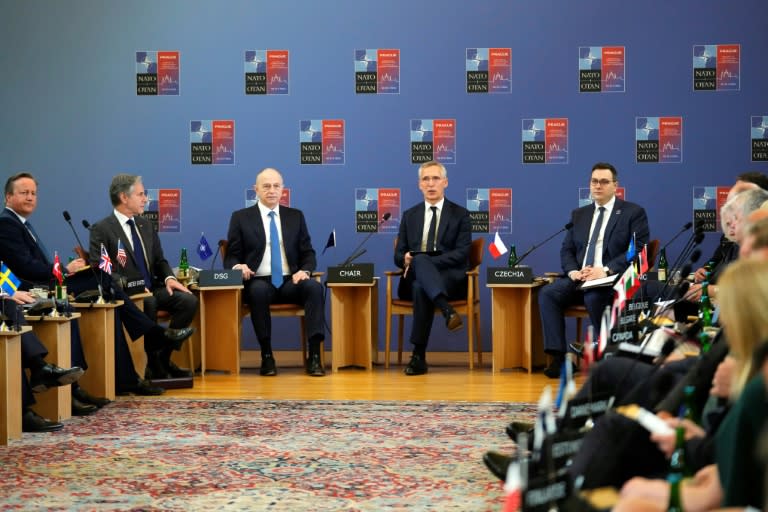NATO chief seeks 'at least' 40 bn euros a year in Ukraine aid

NATO chief Jens Stoltenberg on Friday urged members to commit to providing Ukraine at least 40 billion euros ($43 billion) a year in military aid, seeking to ensure long-term support as war with Russia grinds on.
With Russia waging a major new offensive, NATO foreign ministers met in Prague to lay the groundwork for a July summit in Washington that will both celebrate 75 years of the transatlantic alliance and seek new ways to bolster Ukraine.
The United States has led assistance to Ukraine but is resuming aid after a months-long delay triggered by fighting in Congress, with November's presidential election throwing further doubt on future US funding.
"Since Russia's full-scale invasion in 2022, allies have provided approximately 40 billion euros worth of military aid to Ukraine each year. We must maintain at least this level of support each year, for as long as necessary," Stoltenberg told journalists after the two days of talks.
He said he wanted NATO's 32 countries to share the burden "equitably" and be ready to announce the plan at the Washington summit.
"We need a firm commitment for the long haul to ensure that Ukraine is able to plan, to ensure that Ukraine has the predictability they need to conduct this war of self-defence," Stoltenberg said.
He said one way to measure each country's commitment could be to base it on gross domestic product, but the plan was not finalised.
It is the latest effort by Stoltenberg to put NATO support on firmer footing ahead of a potential return of Donald Trump, who has dismissed both the alliance itself and Ukraine aid as wasteful.
Last month Stoltenberg floated an overall target of 100 billion euros ($108 billion) over five years for Ukraine support, but that fell flat among allies confused over what it would involve.
Czech Foreign Minister Jan Lipavsky welcomed Stoltenberg's latest proposal and said it seemed manageable as it represented only a small fraction of defence expenditure.
But he said that ensuring countries stick to their promises, even when their governments change, was "the trillion-dollar question".
- Firmer support for Ukraine -
After pressing hard at a summit last year, Kyiv has been told firmly by NATO countries not to expect concrete progress toward joining the alliance in Washington.
Opposition is led by the United States and Germany, which are wary of extending NATO's commitment of mutual defence to a country in the throes of war.
US Secretary of State Antony Blinken said instead that the summit would offer a "bridge to membership" that was "strong and well lit", with alliance members concluding bilateral security agreements with Ukraine.
In the latest shift to ramp up support, Blinken confirmed that President Joe Biden had authorised Ukraine to use US weapons against targets across the border into Russia in direct response to attacks.
Asked if rules could be relaxed further, Blinken said the United States would continue to "as necessary, adapt and adjust".
But Turkey, a NATO member that has not joined in sanctions against Russia, aired concern.
"We support the continuation of aid to Ukraine and Ukraine's capacity for dissuasion, but we do not want NATO to take part in this war," Turkish Foreign Minister Hakan Fidan said after the talks.
One area where NATO seems close to a final agreement is a plan for the alliance to take over from the United States in the coordination of weapon supplies to Ukraine.
So far, Washington has been in charge as NATO has stayed clear of involvement in delivering arms because of worries Moscow would see it as a provocation.
Proponents say making the alliance responsible overall could help insulate future deliveries if Trump wins back the White House, while others fear it might just add more bureaucracy to the process.
Stoltenberg noted that NATO allies provided 99 percent of military aid to Ukraine.
"So, it makes sense that NATO should play a greater role in these efforts," he said.
del-sct/js

 Yahoo News
Yahoo News 
